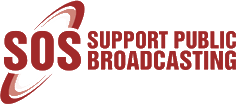
SOS and MMA call for investigation into alleged SABC Editorial interference by Director Mpho Tsedu
June 29, 2023
SOS appoints a Campaigns’ Coordinator
August 15, 2023SOS, MMA, R2K and FXI respond to SABC’s loss of R1 Billion
SOS Support Public Broadcasting Coalition (SOS), Media Monitoring Africa (MMA), Right2Know (R2K) and Freedom of Expression Institute (FXI) are not at all surprised that the SABC has lost R1 Billion at the end of its financial year 2021/2022.
Civil society has been warning of the detriments of switching the analogue signal prematurely and delaying SABC Board appointments. Moreover, over the years these organisations have expressed the urgent need for a new funding model if the SABC is to be profitable.
Analogue Switch- Off (ASO)
On 8 February 2022, the former Minister of Communications and Digital Technologies (DCDT), Ms Khumbudzo Ntshavheni switched off the last analogue transmitter in Limpopo, completing the analogue switch off (ASO) in 5 provinces, namely- Northwest, Limpopo, Free State, Northern Cape and Mpumalanga. The SABC started its financial year in April 2022 without 40% of its audience which was lost during the switch-off. Loss of audiences resulted to a decline in advertising revenue as the rate per minute decreased, which directly translates to loss of income revenue.
The Analogue switch-off was postponed last year on 28 June 2023 when the Constitutional Court handed down judgment in a case of ‘etv vs The Minister of DCDT’ where SOS and MMA were amicus, defending the right of the poor to have access to television news and information. The SABC would have suffered a greater loss if it wasn’t for this monumental postponement. R2K together with other civil society organisations, as part of the #SaveFreeTV Campaign wrote to the Minister of DCDT raising concerns regarding the rushed decision to switch-off when it was evident that not enough work has been done ensure that no one was left behind.
It is important to note that the department which imposed ASO is responsible for any loss the SABC suffered in this regard.
SABC Board Appointment
The term of previous Board ended on 15 October 2022 but a new Board was only appointed on 18 April 2023. Being without a Board for 6 months means that during this period, the SABC was without strategic leadership, accounting authority and the highest decision-making body. About 20 business plans with a potential to generate revenue could not be signed off in the absence of the Board. Apart from ensuring compliance with the SABC Charter, the Board oversees the Corporation’s finances including mitigation of financial loss and risk.
Moreover, a hand over report which contained SABC’s key focus areas, important outstanding matters, and a turnaround strategy for SABC’s finances could not be dealt with in the absence of a Board. Needless to say that this financial crises could have been mitigated if the Board had been appointed in due time. Again, the SABC is not to blame, but government.
During this period civil society was calling for the appointment of the Board to be expedited warning of the destabilisation this would cause at the SABC. SOS wrote letters to the Parliamentary Portfolio Committee on Communications, the National Assembly, and the President on this matter. In fact, MMA took the President to the Constitutional Court in a bid to get him to appoint the Board, which happened eventually. All thanks to this litigation and other civil society efforts.
Loadshedding
Loadshedding and unscheduled blackouts have significantly contributed to the dwindling SABC viewership. Since the beginning of 2023, stage 6 loadshedding has prevailed, that is, all citizens are without electricity for 8-12 hours a day. It is only recently that the grid has eased to stage 2/3. Also, protests erupted in various townships across the country (e.g Soweto) where citizens have reportedly been without electricity for a number of days. Even though the electricity crisis is not within the SABC’s control, it has hampered SABC viewership and subsequently its financial growth.
New Funding Model
Civil society has long called on government to adequately fund the public mandate of the SABC and to devise a viable funding model. In fact, The SOS Coalition submitted a draft alternative SABC Bill, which proposes a mixed funding model for the SABC that includes advertising, sponsorships, the Public Information Levy, access to Local Content Fund and Parliamentary appropriations. The Public Information Levy is payable by every adult person who has access to SABC content using a device including but not limited to, a television set, mobile telephone, computer, tablet, Set-Top-Box, and subscription television broadcasting services. This excludes people who receive grant from the South African Social Security Agency (SASSA).
Recent reports indicated that that 9.2 million people (81%) are not paying their TV licenses which solidifies our view that the license fees system is not working. SOS also believes that a Local Content Fund must be established and financed from a range of sources to ensure the production of quality local public service content across a range of platforms and that the SABC must have access to this fund. This will also ensure that the government is able to fund the public mandate which costs the SABC R2.6 billion annually. MMA, R2K and FXI are members of the SOS Coalition and fully support this funding model.
Government cannot neglect the SABC now, it must provide the required financial boost until the public broadcaster recovers from this government orchestrated crisis.
For more information contact:
Uyanda Siyotula
National Coordinator at SOS Support Broadcasting Coalition (SOS)
060 691 2462
William Bird
Director at Media Monitoring Africa (MMA)
082 887 1370
Yolanda Yalezo
Right2know Campaign (R2K)
083 427 9893
Samkelo Mokhine
Executive Director at Freedom of Expression Institute (FXI)
072 294 0671
